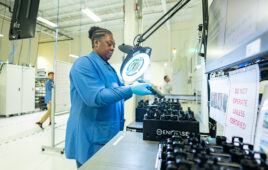The International Trade Commission (ITC) today found injury to the domestic crystalline silicon solar cell industry based on a petition brought by Suniva and SolarWorld. President Trump will receive the U.S. International Trade Commission’s recommendation for action by Nov. 13, and he has 60 days to act on whether to enforce tariffs on foreign solar cells and panels.
We have gathered reaction to this news from various members of the U.S. solar industry. The anti-petition crowd has more numbers and is sure to be vocal all day. We will update as more input comes across.
Pro-petition
“On behalf of the entire solar cell and panel manufacturing industry, we welcome this important step toward securing relief from a surge of imports that has idled and shuttered dozens of factories, leaving thousands of workers without jobs. In the remedy phase of the process, we will strive to help fashion a remedy that will put the U.S. industry as a whole back on a growth path. We will continue to invite the Solar Energy Industries Association (SEIA) and our industry partners to work on good solutions for the entire industry. It is time for the industry to come together to strengthen American solar manufacturing for the long term.”
-Juergen Stein, CEO and president of SolarWorld Americas
Anti-petition
“The ITC’s decision is disappointing for nearly 9,000 U.S. solar companies and the 260,000 Americans they employ. Foreign-owned companies that brought business failures on themselves are attempting to exploit American trade laws to gain a bailout for their bad investments.
“Analysts say Suniva’s remedy proposal will double the price of solar, destroy two-thirds of demand, erode billions of dollars in investment and unnecessarily force 88,000 Americans to lose their jobs in 2018.
“While we continue to believe that this is the wrong decision, based on Suniva and SolarWorld’s mismanagement, we respect the commission’s vote and we will continue to lead the effort to protect the solar industry from damaging trade relief. We expect to be front and center in the ITC remedy process, and in the administration’s consideration of this deeply-flawed case.
“As the remedy phase moves forward, I am determined to reach a conclusion that will protect the solar industry, our workers and the American public from what amounts to a shakedown by these two companies. An improper remedy will devastate the burgeoning American solar economy and ultimately harm America’s manufacturers and 36,000 people currently engaged in solar manufacturing that don’t make cells and panels.”
-Abigail Ross Hopper, president and CEO of the Solar Energy Industries Association (SEIA)
“Anyone closely involved with watching how this trade petition wended its way through the U.S. International Trade Commission process always had a sneaking suspicion the final decision would end up with President Donald J. Trump. The ITC did its due diligence and, after much deliberation, decided these two foreign-owned module makers were indeed harmed by module imports from other countries—but fortunately, today’s decision is only the beginning, not the ending, of the story.
Now the ITC begins its deliberations about what remedies should be imposed on imports, and this will be where the real effects on the industry will be determined. I hope the ITC will conclude only minimal or no tariff increases are necessary. Otherwise, the U.S. solar industry could lose 88,000 or more jobs. I’d also remind President Trump that two-thirds of the solar jobs in America do not require any college education. Losing 88,000 jobs, most of which are blue collar, is a lot for the American economy—and President Trump’s base in particular—to absorb.”
-Tony Clifford, chief development officer of Standard Solar
“This decision brings yet more uncertainty to an industry that has created real value for the United States. The cause and effect impacts of major cost increases have been shown time and again, both in the energy industry and the economy as a whole. Our National Solar Jobs Census finds the dramatic growth in U.S. solar employment over the past several years was driven by the sharply reduced cost of installations. Any new tariffs are likely to increase costs and reduce demand for installations, disrupting the solar jobs market that now employs 260,000 workers in the United States and is valued in the tens of billions of dollars. The next update to our Solar Jobs Census will include more information and analysis on how this decision will impact American solar jobs.”
-Andrea Luecke, president and executive director of The Solar Foundation
SunPower CEO Tom Werner made a lengthy statement about the ruling, starting his blog with “Let’s put it bluntly. The International Trade Commission (ITC) made the wrong decision today in its finding of injury in the Section 201 solar trade case.” Read his full thoughts here.
“The ITC decision to find injury is disappointing because the facts presented made it clear that the two companies who brought this trade case were injured by their own history of poor business decisions rather than global competition, and that the petition is an attempt to recover lost funds for their own financial gain at the expense of the rest of the solar industry. ETAC will continue to fight vigorously during the remedy phase, encouraging Administration officials and Members of Congress to help ensure that no remedies are imposed that would threaten the solar industry’s ability to compete with other energy sources.
“Utilities, power co-ops, retailers, manufacturers and other large commercial users, along with conservative groups who have criticized federal solar subsidies, all agree that unwarranted tariffs would cause severe damage to the solar industry while setting a terrible precedent for future trade cases. Artificially raising the price of solar products would increase costs for solar power consumers and jeopardize tens of thousands of U.S. manufacturing jobs.”
-Paul Nathanson, spokesperson for the Energy Trade Action Coalition (ETAC)
“The imposition of trade remedies on solar technology sought by the two petitioners in this case, Suniva and SolarWorld, could fundamentally change those carefully calibrated assessments of grid stability — and do so without any consequent societal benefits. Ill-conceived energy protectionism in the guise of a trade remedy, on the other hand, will only do more harm than good. We would all do well to take heed of recent events and remember to prioritize the importance of maintaining a diverse and resilient electric grid. The government should say no to the Section 201 trade petition for solar.”
-Scott Segal, executive director of the Electric Reliability Coordinating Council
“Solar energy is one of the most promising sectors in the American economy, providing good construction and manufacturing jobs and valuable products at a low cost to consumers. It’s been creating jobs for electricians who install utility scale and rooftop solar systems around the country. These are good, middle-class jobs that promote apprenticeship, community based hiring, and veterans. All this progress would be placed at risk if the government decided to cut off the cells and modules that form the basic ingredients of the U.S. solar supply chain.”
-John M. Grau, CEO of the National Electrical Contractors Association
“Today’s decision by the U.S. International Trade Commission (ITC) raises serious concern about the potential for tariffs that could increase electricity prices and threaten a thriving solar industry that is one of the nation’s most important economic drivers.
“The next step in the ITC process is the establishment of remedies, which could include tariffs on imported polysilicon solar panels that have helped drive a massive increase in U.S. solar energy deployment. Tariffs at anywhere near the rates sought by Suniva would threaten the cost-competitiveness of solar power in the United States, and lead to higher electric power prices and slower growth in the nation’s economy.
“In the coming weeks and months, ACORE and its allies will seek to work with White House officials urging that the President, who ultimately has discretion to craft the response to today’s decision, focus on strategies that boost domestic manufacturing without interfering with the fundamental economics and cost competitiveness of solar power.”
-Gregory Wetstone, president and CEO of the American Council On Renewable Energy (ACORE)
“It is disappointing that two uniquely mismanaged and uncompetitive foreign-owned companies have been able to benefit from a process meant to protect U.S. businesses that have truly been harmed by subsidized foreign competition.
“We look forward to working with the Trump Administration to ensure the remedies considered do not harm our robust, rapidly expanding solar industry, which employs over 260,000 Americans. Tariffs, subsidies, and other market distorting remedies and policies harm both taxpayers and consumers who would benefit from open markets and robust competition.
“Sunnova supports a level playing field where American companies can openly compete in free markets and will continue to offer choices to consumers everywhere.”
-John Berger, CEO of Sunnova
“Utilities across the Southeast are currently planning to add over 4,000 MW of solar, which will represent over $4 billion in investments throughout our region. All those jobs, property values, and clean energy opportunities are now at serious risk given today’s decision.”
-Dr. Stephen A. Smith, executive director of the Southern Alliance for Clean Energy
“At BlueWave Solar we lead in the development and financing of solar energy projects and provide services that have enormous economic benefits to communities, nonprofits, homeowners and construction workers throughout Massachusetts. We are also providing real savings to homeowners in other states including North Carolina, South Carolina and Rhode Island. These benefits are driven in large part by the enormous improvements the industry has achieved over the past decade and state-level leadership in energy policy.
“We are very disappointed that the U.S International Trade Commission found in favor of Suniva and SolarWorld’s complaint, which puts at risk these benefits and the more than 250,000 solar jobs might be harmed by new tariffs on solar panels; however, BlueWave, our customers, our projects and our communities are resilient and will overcome this. It is our hope that during the remedy phase, the U.S. ITC takes the severe negative impact a tariff will have on the U.S. solar industry into account. Any tariffs recommended by the U.S. International Trade Commission should be minimal, exempt countries with existing trade agreements with the United States, and be set to decline rapidly.
“BlueWave is especially grateful to our partner installers, many of whom are small business owners, who work hard every day to help achieve our mission of making solar available to everyone, everywhere a reality. We stand with solar installers and manufacturing workers, who are the backbone of the solar industry, as they will be severely impacted by an aggressive tariff.”
-Trevor Hardy, CEO; Eric Graber-Lopez, President; and John DeVillars, Chairman of BlueWave Solar
“The ITC board must take into consideration the trickledown effect this will have on the industry as a whole, and its impact on everyone from installers to suppliers. Either way this turns out, Boviet feels this is an opportunity to show our quality and bankability. If we are all on the same playing field with pricing then Boviet will have a strong presence based on our product and our Powerway parent company background.”
-John Bereckis, president of solar modules for Boviet Solar USA
“I founded Array Technologies almost 30 years ago and today we are a global leader in the manufacture of solar tracking systems for the utility-scale solar industry. The domestic solar industry is the core of our business and much of our success comes directly from having a strong and viable domestic market. To remain a leading global equipment supplier, it is critical that we continue to innovate at scale in our domestic market. I have personally worked relentlessly and watched as the industry has made incredible strides to bring solar energy to grid parity. Solar energy is now a mega trend in energy because it is clean, renewable and cost-effective and comes with the added benefit of employing hundreds of thousands of Americans.
“Array Technologies is a significant employer in New Mexico and has directly created hundreds of good-paying jobs in our struggling local economy, not to mention the many more indirect jobs that exist as a result our success. The same job growth has occurred across the solar value chain. With this ruling, tens of thousands of those jobs and billions of dollars in economic activity are in grave jeopardy because two firms made poor business decisions and are now asking the government to help them recoup their losses.
“If the ITC recommends punitive tariffs, it will strike a severe blow to American innovation, American manufacturing and construction jobs, and American competitiveness in the global solar energy market, and will cede leadership to other countries in this vital industry. It is imperative that the industry bands together in the coming weeks to demonstrate how solar has become central to American job growth and our rapidly changing electricity market.”
– Ron Corio, CEO and founder of Array Technologies
This story is developing.





With the proposed tariff values exceeding the value of the ITC, this is nothing short of a tax on the sun. We need to be taxing carbon to address climate change, not taxing the only form of emmissionless energy that can be owned by consumers! #nosuntax